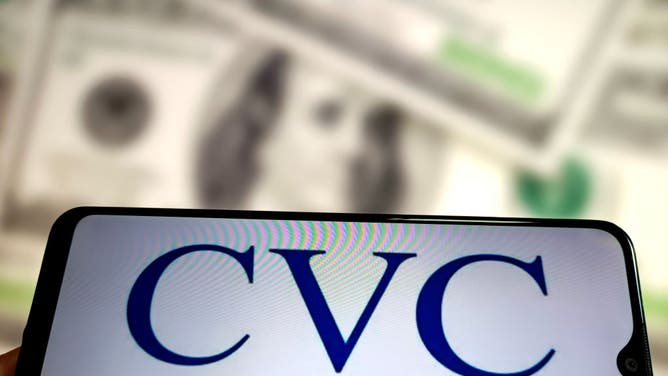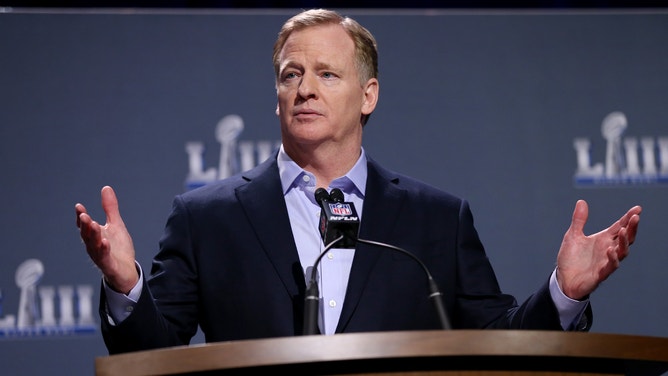NFL Owners Expected To Vote On New Ownership Structure That Comes With Great Rewards, Risks
Senior NFL Writer Armando Salguero will be taking your questions about the NFL and ANYTHING else you want to ask him about weekly. You can join his mailbag at Armando.Salguero@Outkick.com and he'll post your questions and his answers.
The NFL has been flirting with the idea of allowing private equity firms to become part of the league's ownership structure. On Tuesday, that flirtation may become a serious romance.
The league's owners are meeting in Minneapolis for one day, ostensibly to vote on whether to approve the introduction of private equity ownership to the NFL.

Photo Illustration European Private Equity Firm CVC Capital Partners Partners, on July 22, 2023, in Suqian, Jiangsu Province, China. (Photo Illustration by Costfoto/NurPhoto via Getty Images)
NFL Ready To Change Ownership Rules
The NFL has never before allowed institutional wealth, including private equity firms, to own or even invest in NFL franchises. The league, which happens to be the largest and most successful in America, has, throughout its history, had franchises owned by individuals and their partners.
But the cost of doing business has grown, as has the cost of owning a franchise -- to the point that fewer and fewer individuals are able to either fully buy or run a typical franchise.
So the league is apparently ready to drop at least some of the obstacles that have until now made it the only professional league in America preventing private equity ownership.
The issue has been on the radar for nearly a year. NFL owners have spent the past year studying and authoring potential changes to the NFL's rules for team ownership.

Roger Goodell In Favor Of Change
Commissioner Roger Goodell has multiple times spoken of the issues in a tone that suggests a change is coming.
"As sports evolve, we want to make sure our policies reflect that," Goodell told CNBC in July. "We’ve had a tremendous amount of interest [from private equity firms], and we believe this could make sense for us in a limited fashion, probably no more than 10 percent of a team."
"That would be something we think could complement our ownership and support our ownership policies."
It would, frankly, be an upset if NFL ownership doesn't make this change. Goodell is great at whipping votes and there would be no meeting of billionaires in Minnesota if the votes to make the ownership rules changes didn't already exist.
And that begs questions:
What are private equity firms? Why are they needed? And what are the risks?

A U.S. flag flies outside the headquarters of BlackRock Inc. in New York, U.S., on Tuesday, April 20, 2010. BlackRock Inc., the world's largest asset manager, and Blackstone Group LP's GSO Capital Partners LP are forming mutual funds to invest in loans as the London interbank offered rate rises to the highest level since August. Photographer: Daniel Acker/Bloomberg via Getty Images
More Money For NFL Owners
PE firms pool money from investors into a fund. The people that run the firm then invest the funds by buying stakes in available assets – in this case an NFL franchise.
The goal is to eventually sell the investment later at a profit.
And NFL teams almost always deliver a profit. Indeed, there is no NFL team that has ever sold at a net loss since the NFL merged in 1970.
So why would any individual billionaire owner want to share those eventual profits with a partner?
The partner, it should be noted, is silent. The PE, limited to 10 percent as Goodell said, would have no ability to steer the franchise in any direction it wishes. That remains in the hands of the controlling owner.
But the PE does, in the short-term, infuse a partner franchise with millions of dollars with the understanding it will collect on that investment and profit from that investment later on.
Sounds like a great idea, right?
Well, there are some risks, which is the reason it has taken so long for the NFL to get to where it finds itself on Tuesday.

A building stands on top of a hill on Little St. James Island, owned by fund manager Jeffrey Epstein, in St. Thomas, U.S. Virgin Islands, on Wednesday, July 10, 2019. This is where Epstein - convicted of sex crimes a decade ago in Florida and now charged in New York with trafficking girls as young as 14 - repaired, his escape from the toil of cultivating the rich and powerful. Photographer: Marco Bello/Bloomberg via Getty Images
Private Equity Does Come With Risk
Private equity firms are not always a license to print money. Bankruptcy filings by private equity and venture capital-backed companies in the USA surged to 104 in 2023, the highest annual total on record, according to S&P Global Market Intelligence data.
PE firms are ultimately run by people. And people are flawed creatures who sometimes make curious (embarrassing) decisions.
Stephen Deckoff, founder of private equity firm Black Diamond Capital Management, purchased the two Caribbean islands accused serial sex offender Jeffrey Epstein made infamous as a hub of his notorious misdeeds.
And while it is not in any way illegal for anyone to have bought those islands, can you imagine the raised eyebrows it would cause if any future private equity firm tied to the NFL invested in a similarly dubious property or business?
Not optimal.
To shield itself from such drama, the NFL is expected to release a list of vetted firms it is willing to do business with. And none of those institutional investors will hold any voting rights with or on behalf of the teams they join.
Ultimately, the richest professional sports league in America is about to get richer.